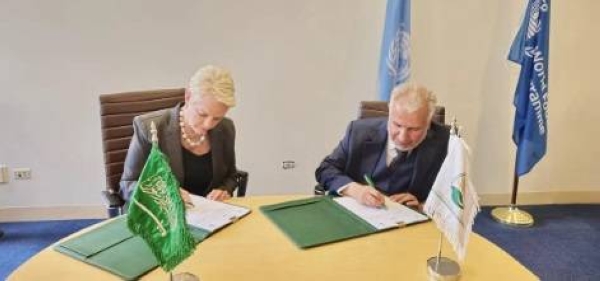The King Salman Humanitarian Aid and Relief Centre (KSrelief) and the World Food Programme (WFP) have joined forces to combat acute malnutrition in drought-affected areas of Somalia. The initiative, announced during the 79th session of the United Nations General Assembly in New York, will provide assistance to 180,148 individuals with a funding commitment of $4.5 million. The agreement was signed by Dr. Abdullah Al Rabeeah, Advisor to the Royal Court and Supervisor General of KSrelief, and WFP Executive Director Cindy Hensley McCain. Through this partnership, 1,068.5 metric tons of food will be purchased to meet the nutritional needs of 57,301 pregnant and lactating women, and 122,847 children under the age of two in Somalia.
This collaboration underscores Saudi Arabia’s ongoing dedication to humanitarian causes through KSrelief, demonstrating its pledge to aid vulnerable populations in some of the world’s most disadvantaged regions. The initiative aims to alleviate the impacts of malnutrition and enhance the well-being of those affected by the enduring crisis in Somalia. By targeting key demographics such as pregnant and lactating women, as well as young children, the program seeks to address the immediate nutritional needs of those most at risk. This proactive approach aligns with the broader goal of improving the overall health and resilience of communities grappling with food insecurity in Somalia.
The funding commitment of $4.5 million will enable the purchase of essential food supplies to support the targeted populations in Somalia. This substantial investment reflects the shared commitment of KSrelief and WFP to address the urgent humanitarian needs in the country. By providing vital resources such as food assistance, the initiative aims to mitigate the impact of acute malnutrition and ensure the well-being of vulnerable groups in Somalia. The agreement between KSrelief and WFP signifies a collaborative effort to tackle the root causes of malnutrition through targeted interventions and sustained support for communities facing food insecurity.
In addition to providing immediate relief through food assistance, the collaboration between KSrelief and WFP emphasizes the importance of long-term solutions to address malnutrition in Somalia. By focusing on pregnant and lactating women, as well as young children, the initiative prioritizes the nutritional needs of the most vulnerable members of society. Through this targeted approach, the program seeks to build resilience and promote sustainable development in drought-affected areas of Somalia. By addressing the underlying causes of malnutrition, such as food insecurity and limited access to nutritious food, the initiative aims to create lasting impact and improve the overall well-being of communities in need.
This partnership between KSrelief and WFP exemplifies the power of collective action in addressing complex humanitarian challenges. By pooling resources and expertise, both organizations can leverage their strengths to deliver impactful and sustainable assistance to vulnerable populations in Somalia. The agreement signed during the United Nations General Assembly session in New York underscores the global commitment to addressing the crisis of malnutrition in Somalia. Through targeted interventions and coordinated efforts, KSrelief and WFP are working towards a common goal of alleviating the suffering of those affected by acute malnutrition and building a more resilient future for communities in need.
In conclusion, the cooperation agreement between KSrelief and WFP represents a significant step towards addressing the urgent humanitarian needs in Somalia. By focusing on the nutritional needs of pregnant and lactating women, as well as young children, the initiative aims to make a tangible difference in the lives of vulnerable populations in drought-affected areas. Through this partnership, Saudi Arabia reaffirms its commitment to supporting those in need and demonstrates its role as a global leader in humanitarian assistance. As the program unfolds, it is expected to yield positive outcomes and contribute to the overall well-being and resilience of communities facing food insecurity in Somalia.










